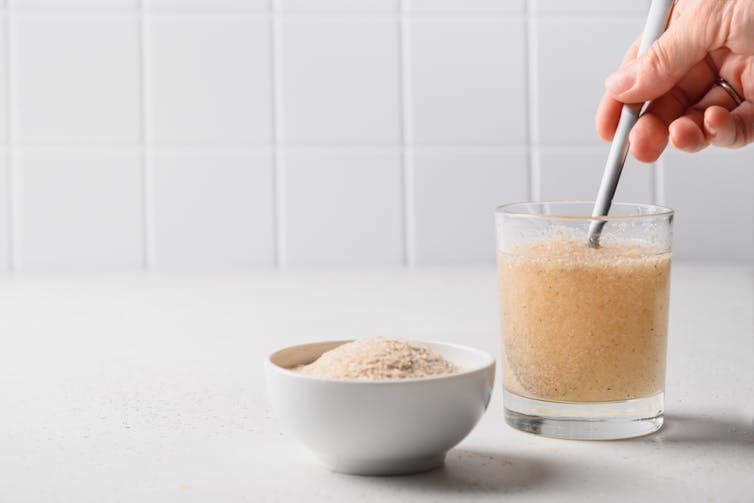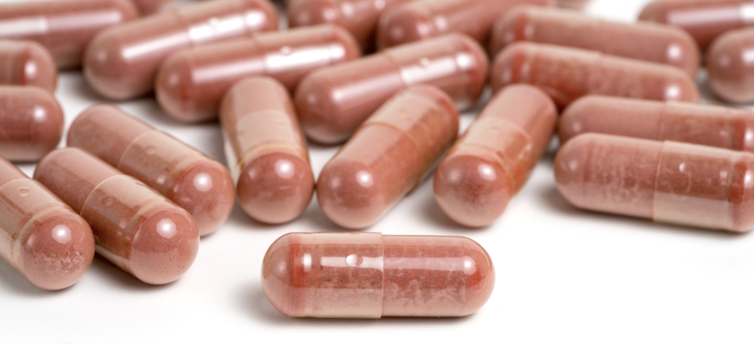

You still need to quit smoking, reduce stress, exercise regularly and get enough sleep



Your GP says you have high cholesterol. You’ve six months to work on your diet to see if that’ll bring down your levels, then you’ll review your options.
Could taking supplements over this time help?
You can’t rely on supplements alone to control your cholesterol. But there’s some good evidence that taking particular supplements, while also eating a healthy diet, can make a difference.
There are two main types of cholesterol, both affecting your risk of heart disease and stroke. Both types are carried in the bloodstream inside molecules called lipoproteins.
Low-density lipoprotein or LDL cholesterol
This is often called “bad” cholesterol. This lipoprotein carries cholesterol from the liver to cells throughout the body. High levels of LDL cholesterol in the blood can lead to the build-up of plaque in arteries, which leads to an increased risk of heart disease and stroke.
High-density lipoprotein or HDL cholesterol
This is often called “good” cholesterol. This lipoprotein helps remove excess cholesterol from the bloodstream and transports it back to the liver for processing and excretion. Higher levels of HDL cholesterol are linked to a reduced risk of heart disease and stroke.
Diet can play a key role in reducing blood cholesterol levels, especially LDL (“bad”) cholesterol. Healthy dietary choices are well recognised. These include a focus on eating more unsaturated (“healthy”) fat (such as from olive oil or avocado), and eating less saturated (“unhealthy”) fat (such as animal fats) and trans fats (found in some shop-bought biscuits, pies and pizza bases).

An additional way to significantly reduce your total cholesterol and LDL cholesterol levels through diet is by eating more soluble fibre.
This is a type of fibre that dissolves in water to form a gel-like substance in your gut. The gel can bind to cholesterol molecules preventing them from being absorbed into the bloodstream and allows them to be eliminated from the body through your faeces.
You can find soluble fibre in whole foods such as fruits, vegetables, oats, barley, beans and lentils.
There are also many fibre supplements and food-based products on the market that may help lower cholesterol. These include:
natural soluble fibres, such as inulin (for example, Benefiber) or psyllium (for example, Metamucil) or beta-glucan (for example, in ground oats)
synthetic soluble fibres, such as polydextrose (for example, STA-LITE), wheat dextrin (also found in Benefiber) or methylcellulose (such as Citrucel)
natural insoluble fibres, which bulk out your faeces, such as flax seeds.
Most of these supplements come as fibres you add to food or dissolve in water or drinks.
Psyllium is the fibre supplement with the strongest evidence to support its use in improving cholesterol levels. It’s been studied in at least 24 high-quality randomised controlled trials.
These trials show consuming about 10g of psyllium a day (1 tablespoon), as part of a healthy diet, can significantly lower total cholesterol levels by 4 per cent and LDL cholesterol levels by 7 per cent.

Other cholesterol-lowering supplements, such as probiotics, are not based on fibre. Probiotics are thought to help lower cholesterol levels via a number of mechanisms. These include helping to incorporate cholesterol into cells, and adjusting the microbiome of the gut to favour elimination of cholesterol via the faeces.
Using probiotics to reduce cholesterol is an upcoming area of interest and the research is promising.
In a 2018 study, researchers pooled results from 32 studies and analysed them altogether in a type of study known as a meta-analysis. The people who took probiotics reduced their total cholesterol level by 13 per cent.
Other systematic reviews support these findings.
Most of these studies use probiotics containing Lactobacillus acidophilus and Bifidobacterium lactis, which come in capsules or powders and are consumed daily.
Ultimately, probiotics could be worth a try. However, the effects will likely vary according to the probiotic strains used, whether you take the probiotic each day as indicated, as well as your health status and your diet.
Red yeast rice is another non-fibre supplement that has gained attention for lowering cholesterol. It is often used in Asia and some European countries as a complementary therapy. It comes in capsule form and is thought to mimic the role of the cholesterol-lowering medications known as statins.
A 2022 systematic review analysed data from 15 randomised controlled trials. It found taking red yeast rice supplements (200-4,800mg a day) was more effective for lowering blood fats known as triglycerides but less effective at lowering total cholesterol compared with statins.
However, these trials don’t tell us if red yeast rice works and is safe in the long term. The authors also said only one study in the review was registered in a major database of clinical trials. So we don’t know if the evidence base was complete or biased to only publish studies with positive results.

Always speak to your GP and dietitian about your plan to take supplements to lower your cholesterol.
But remember, dietary changes alone — with or without supplements — might not be enough to lower your cholesterol levels sufficiently. You still need to quit smoking, reduce stress, exercise regularly and get enough sleep. Genetics can also play a role.
Even then, depending on your cholesterol levels and other risk factors, you may still be recommended cholesterol-lowering medications, such as statins. Your GP will discuss your options at your six-month review.![]()
Lauren Ball, Professor of Community Health and Wellbeing, The University of Queensland and Emily Burch, Dietitian, Researcher & Lecturer, Southern Cross University
This article is republished from The Conversation under a Creative Commons license. Read the original article.
We are a voice to you; you have been a support to us. Together we build journalism that is independent, credible and fearless. You can further help us by making a donation. This will mean a lot for our ability to bring you news, perspectives and analysis from the ground so that we can make change together.

Comments are moderated and will be published only after the site moderator’s approval. Please use a genuine email ID and provide your name. Selected comments may also be used in the ‘Letters’ section of the Down To Earth print edition.